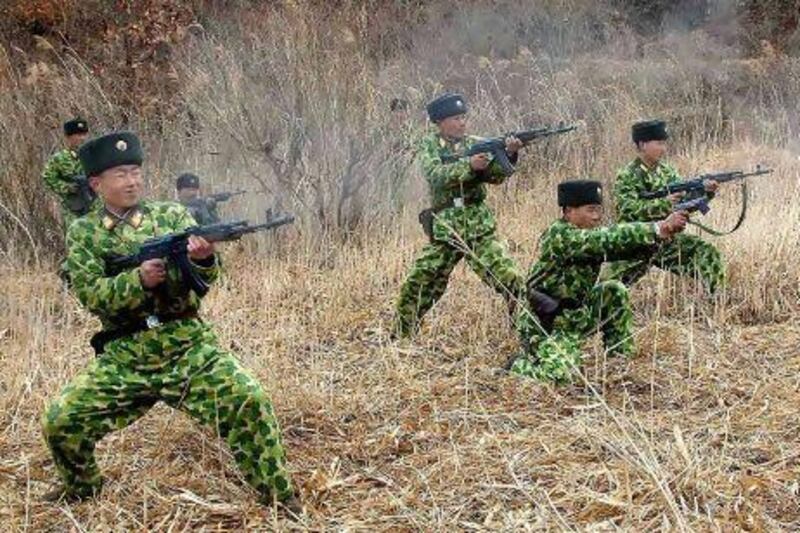SEOUL // North and South Korea staged duelling war games yesterday as aggressive rhetoric from each side rose to its highest level since North Korea rained artillery shells on a South Korean island in 2010.
Enraged over the South's joint military drills with the United States and recent UN sanctions, Pyongyang has piled threat on top of threat, including vows to launch a nuclear strike on the US and to scrap the nearly 60-year-old armistice that ended the Korean War. Seoul has responded with tough talk of its own and has placed its troops on high alert.
North Korea's main newspaper, Rodong Sinmun, reported that the armistice was nullified yesterday as Pyongyang had previously announced. The North followed through on another promise, shutting down a Red Cross hotline that the North and South used for general communication and to discuss aid shipments and separated families' reunions.
The 11-day military drills that started yesterday involve 10,000 South Korean and about 3,000 US troops. Those coincide with two months of separate US-South Korean field exercises that began on March 1.
Also continuing are large-scale North Korean drills that Seoul says involve the army, navy and air force. The South Korean defence ministry said there have been no military activities it considers suspicious.
Despite the heightened tension, there were signs of business as usual.
The two Koreas continue to have at least two working channels of communication between their militaries and aviation authorities.
One of those hotlines was used yesterday to give hundreds of South Koreans approval to enter North Korea to go to work. Their jobs are at the only remaining operational symbol of joint inter-Korean cooperation, the Kaesong industrial complex. It is operated in North Korea with South Korean money and know-how and a mostly North Korean workforce.
The North Korean rhetoric escalated as the UN Security Council last week approved a new round of sanctions over Pyongyang's latest nuclear weapons test on February 12.
Analysts said that much of the bellicosity is meant to shore up loyalty among citizens and the military for North Korea's young leader, Kim Jong-un.
"This is part of their brinkmanship," said Daniel Pinkston, a Seoul-based expert on North Korea with the International Crisis Group think tank. "It's an effort to signal their resolve, to show they are willing to take greater risks, with the expectation that everyone else caves in and gives them what they want."
Part of what North Korea wants is a formal peace treaty to end the Korean War, instead of the armistice that leaves the peninsula still technically in a state of war. It also wants security guarantees and other concessions, direct talks with Washington, recognition as a nuclear weapons state and the removal of 28,500 US troops in South Korea.
Mr Pinkston said there is little chance of fighting breaking out while war games are being conducted, but he added that he expects North Korea to follow through with a somewhat mysterious promise to respond at a time and place of its own choosing.
Its vow to scrap the 1953 armistice is one it has made previously, and it is believed to be incapable of making good on its threat to unleash a long-range nuclear missile on America.
Nevertheless, South Korean and US officials have been closely monitoring Pyongyang's actions and parsing its recent rhetoric, which has been more warlike than usual.
One analyst said Kaesong's continued operations show that North Korea's cutting of the Red Cross communication channel was symbolic. More than 840 South Koreans were set to cross the border yesterday to Kaesong, which provides a badly-needed flow of hard currency to a country where many face food shortages, according to Seoul's Unification Ministry.
"If South Koreans don't go to work at Kaesong, North Korea will suffer" financially, said an analyst, Hong Hyun-ik, at the private Sejong Institute in South Korea. "If North Korea really intends to start a war with South Korea, it could have taken South Koreans at Kaesong hostage."





